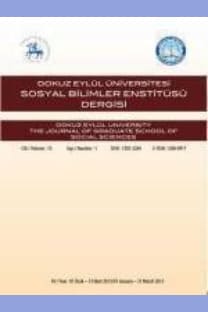İnşaat sözleşmelerine ilişkin Türkiye muhasebe standardı (tms 11) çerçevesinde yıllara yaygın inşaat taahhüt işlerinin muhasebeleştirilmesi
İnşaat Taahhüt İşlemleri Muhasebesi, Türkiye Muhasebe
Within the frame of construction contractual Turkish accounting standards (tms 11), accounting of construction contracting works over the years
-,
___
- Adıyaman, B. (2010). İnşaat sektörünün genel değerleme. Türkiye Birinci Sektörel Muhasebe Uygulamaları Sempozyumu. Kayseri SMMMO, 29-35. Adrian, J. J. ve Adrian, D. J. (2006). Construction accounting: financial, managerial, auditing, and tax. Fourth Edition. Illinois, USA: Stipes Publishing L.L.C. Akdoğan, N. ve Sevilengül O. (2007). Türkiye muhasebe standartları ile uyumlu tekdüzen muhasebe sistemi uygulaması. 12. Baskı. Ankara: Gazi Kitabevi. Alexander, D., Britton, A. ve Jorissen, A. (2009). International financial reporting and analysis. 4th edition, UK: South Western Cengage Learning. Epstein, B. J., Jermakowicz, E. K. (2010). 2010 Interpretation and application of international financial reporting standards. Canada: Wiley&Sons,Inc. Greuning, H. V. 2005. International financial reporting standards: a practical guide. The World Bank, USA. Karyağdı, M. (2009). İnşaat işlerinde vergi ve muhasebe mevzuatı ile inşaat sözleşmelerine ilişkin Türkiye muhasebe standardı TMS-11’in analizi-1. Yaklaşım Dergisi, 17 (197): 108-114. Kavacık, M. (2008). Yıllara yaygın inşaat ve onarım işlerinde vergilendirme ve muhasebe işlemleri. Yayınlanmamış Yüksek Lisans Tezi. Celal Bayar Üniversitesi, Sosyal Bilimler Enstitüsü, Manisa. Kieso, D. E. Weygandt, J. J. ve Warfield, T. D. (2001). Intermediate accounting. 10th edition. USA: Wiley. Kızılot, Ş. (2000). İnşaat muhasebesi vergilendirilmesi mevzuatı ve asgari işçilik. Ankara: Yaklaşım Yayınları. Örten, R. ve Karapınar, A. (2009). Dönem sonu muhasebe uygulamaları. Ankara: Gazi Kitabevi. Örten, R. Ve Kaval H. ve Karapınar A. (2007). Türkiye muhasebe – finansal raporlama standartları TMS – TFRS. Ankara: Gazi Kitabevi. Sayarı, M. (2004). İnşaat taahhütleri (yıllara yaygın inşaat ve onarım sözleşmeleri) standardı. Muhasebe Bilim Dünyası Dergisi, 6 (3): 61-76. Sayarı, M. (2010). İnşaat taahhüt sözleşmelerinin muhasebeleştirilmesi. Türkiye Birinci Sektörel Muhasebe Uygulamaları Sempozyumu. Kayseri, SMMMO 2010: 107-118. Susmuş, T. ve Zengin Y. (2008). Muhasebe standartları, temel kavramlar ve yaklaşımlar; Türkiye muhasebe standartları, temel kavramlar ve yaklaşımlar: Türkiye Muhasebe Standartları Sempozyumu XII, İnşaat Sözleşmeleri Standardı (TMS 11) ve Uygulamaları, 26-30 Kasım 2008, KIBRIS: 180-241. Şenlik, M. (2005). İnşaat muhasebesi. 1.Baskı. Ankara: Detay Yayıncılık. Yüksel O. (2002). Yapı işlerinde ihale düzenimiz. Ege Üniversitesi Basımevi: İzmir. T.C. Yasalar, (06.01.1961) Gelir Vergisi Kanunu,193 Sayılı. Ankara: 10700 sayılı Resmi Gazete, http://www.resmigazete.gov.tr/arsiv/10700.pdf (Erişim Tarihi: 18.01.2011) T.C. Yasalar, (09.05.1985) İmar Kanunu, 3194 Sayılı. Ankara: 18749 sayılı Resmi Gazete, http://www.resmigazete.gov.tr/arsiv/18749.pdf, (Erişim Tarihi: 07.02.2011) T.C. Yasalar, (08.12.2001) Medeni Kanun, 4721 Sayılı. Ankara: 24607 sayılı Resmi Gazete,http://www.resmigazete.gov.tr/eskiler/2001/12/20011208.htm, (Erişim Tarihi: 01.02.2011) Türkiye Muhasebe Standardı, 11 26/10/2005 Tarih ve 25978 Sayılı Resmi Gazete, http://www.resmigazete.gov.tr/eskiler/2005/10/20051026.htm, (Erişim Tarihi: 09.01.2011) IFRS Workbooks for accounting professionals, “IAS construction contracts”, http://accountingreform.ru/en/materials/accounting/workbooks//en/ materials/accounting/workbooks/, (Erişim Tarihi: 16.02.2011). TUİK İşgücü istatistikleri veri tabanı, http://tuikrapor.tuik.gov.tr/reports/ (Erişim Tarihi:25.07.2011).
- ISSN: 1302-3284
- Yayın Aralığı: 4
- Başlangıç: 1999
- Yayıncı: Dokuz Eylül Üniversitesi Sosyal Bilimler Enstitüsü
Türkiye'de döviz piyasası müdahalelerinin sterilizasyon maliyeti
Sedef AKGÜNGÖR, Hans Van TRIJP, Erica Van HERPEN, Yaprak GÜLCAN, Yeşim KUŞTEPELİ
Ömer ÖZPINAR, E. Yasemin BOZDAĞLIOĞLU
E. Yasemin BOZDAĞLIOĞLU, Ömer ÖZPINAR
The angel-woman and the eve-woman as the others in “Weekend” by fay weldon
Yereli Ayşe N., Nilgün KAYALI, Lale DEMİRLİOĞLU
Yoksullukla mücadelede sosyal girişimcilik: Ashoka üyelerinden sosyal yenilikçi örnek uygulamalar
